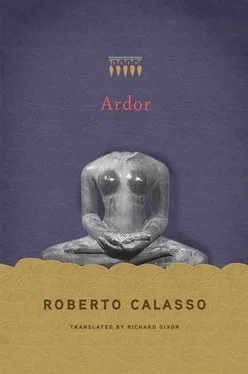Śatapatha Brāhmaṇa
Satī
sattra (sacrificial “session”)
sattva (“luminous quality”)
Saturn
satya (“truth”); see also truth
Satyakāma Jābāla
Sātyayajña
Satyrs
sautrāmaṇī (rite dedicated to Indra, the “good protector”)
Savitṛ
Sāyaṇa
Scarpetta, Eduardo
Schaller, George Beals
Schayer, Stanisław
Schopenhauer, Arthur
Schreber, Daniel Paul
Schroeder, Leopold von
science
secrecy
secularization
secular morality
secular society
Self ( ātman ); see also ātman
self-emptying ( kénōsis ); see also kénōsis
self-existing ( svayambhū )
self-mortification
self-referentiality; see also ātman ; reflection; Self
self-reflection
self-sacrifice
semen
Semiramis
Senart, Émile
serpent
Śeṣa
śeṣa (“residue”); see also residue; surplus; ucchiṣṭa
Seven Seers (Saptarṣis); see also rṣis
sex, sexual pleasure; see also coitus
Siberia, Siberians
Silburn, Lilian
silence ( tūṣṇīm )
Simon, Erika
simulacrum
Sirius
Śiva; see also Rudra
skin; see also clothing; nakedness
sky
sleep
society
Socrates
soma (“juice”)
Soma, King
soma sacrifice
Sophists
Sophocles
sovereignty
space ( ākāśa, kha, antarikṣa ); see also ākāśa; kha
speech ( vāc ); see also Vāc; vāc
Spinoza, Baruch
splendor; see also Śrī
spoons ( juhū, sruva, upabhṛt )
śraddhā (“trust,” “faith”)
Śrī
Staal, Frits
Strehlow, Carl Friedrich
strength
Strindberg, August
study
substance, matter
substitution
substitutive thinking; see also digital mode of thought
Sudās
suicide; see also Islamist suicide-killers
Su-ilisu
sukha (“happiness”); see also happiness; joy
Sumerians
Sun (Sūrya)
sun
Suparṇī
surplus; see also bhuman ; residue; śesa
Sūtra (“thread,” “rule”)
sva (“of his own,” “self”); see also ātman ; Self; self-referentiality
svādhyāya (“inner recitation”); see also reader
svāhā (ritual exclamation)
svayambhū (“self-existing”)
Śvetaketu Āruṇeya or Auddālaki
svid (particle that introduces a question)
Sviṣṭakṛt (“he who offers well the sacrifice”)
Swaminathan, C. R.
Swiss Guards
symbol
Taittirīya Brāhmaṇa
Taittirīya Saṃhitā
Taittirīya Upaniṣad
tamas (“darkness”); see also sattva
tan- (“to tend,” “to extend”)
Tantrism
tānūnaptra (ceremony connected to Tanūnapāt, a form of Agni “son of himself”)
tapas (“ardor”)
Tārā
tat tvam asi (“this you are”)
tejas (“incandescent energy”)
témenos (land marked out and excluded from common use)
temple
Ten Kings
Thales
Theogony (Hesiod)
thought; see also Vedic thought
Thucydides
thunderbolt ( vajra )
thýein (“to sacrifice”)
Tiki, tiki
Timaeus (Plato)
time
Tiresias
triṣṭubh (verse form consisting of four lines of eleven syllables); see also meters
truth ( ṛta, satya ); see also ṛta ; untruth
Tvaṣṭṛ (“Craftsman”)
tyāga (“yielding,” “detachment”)
ucchiṣṭa (“residue”); see also residue; Śeṣa; śeṣa
Uddālaka Ᾱruṇi
udgātṛ (officiant “chanter” of the hymns of the Sāmaveda ); see also chant, chanter
udumbara ( Ficus glomerata )
universal society
unmanifest ( asat ); see also manifest
untruth; see also truth
Upakosala Kāmalāyana
upaniṣad (“secret connection”); see also bandhu ; connections; correspondences; equivalences; nexus; sampad
Upaniṣads; see also Bṛhadāraṇyaka Upaniṣad; Chāndogya Upaniṣad; Kaṭha Upaniṣad; Taittirīya Upaniṣad
upasad (“siege,” triple offering of ghee to Agni, Soma, and Viṣṇu)
Urabunna
Urvaśī; see also Nymphs
Uśānā (plant from which the soma is prepared)
Uṣas; see also Dawn
Uṣasta Cākrāyaṇa
Utnapištim
Uttara Nārāyaṇa (the second part of the puruṣasūkta )
Vāc (“Speech”)
vāc (“speech,” “voice”); see also speech
vagina
vajra (“thunderbolt”); see also thunderbolt
Valeri, Valerio
Vālmīki
value; see also exchange; money
Vāmadeva
vānaprastha (“withdrawn into the forest”)
vara (“boon”); see also boons and curses
Varanasi
Vārṣṇya
Varuṇa (Lüders)
Varuṇa
varuṇapraghāsa (rite of atonement connected to Varuṇa)
vaṣaṭ (ritual exclamation)
Vasiṣṭha
Vasiṣṭha Caikitāneya
Vāstavya (“connected to the site and to the residue”); see also Rudra; vāstu
vāstu (“site,” “residue”); see also residue; śeṣa; ucchiṣṭa
Vasu
Vatican Council, Second
Vāyu (“Wind”)
veda (“knowledge”); see also knowledge
Veda
Vedānta; see also Śaṅkara
vedi (altar); see also altar
Vedic civilization
Vedic thought; see also thought
vegetarianism
vijñāna (“discernment”)
victim
Videha
village
Vinatā
violence, nonviolence
vípra (“quivering,” poetic inspiration); see also poetry
virāj (vedic verse form consisting of four lines of ten syllables); see also meters
Virāj
visible; see also invisible
Viṣṇu
visṛṣṭi (“further creation”); see also creation
viṣuvat (central day of a yearlong sacrifice)
Viśvāmitra
Viśvarūpa
Viśvāvasu
Viśvedevāḥ
vital breaths ( prāṇa ); see also breath
Vivasvat
voice; see word; Vāc; vāc
Voltaire
vow ( vrata ); see also mahāvrata
vṛ- (“to cover,” “to wrap”)
vrata (“way of life,” “vow”); see also vow
Vṛṣākapāyī
Vṛṣākapi
Vṛtra
Vyāsa
Wagner, Richard
wakefulness
walking upright
war
warrior ( kṣatriya ); see also kṣatriya
water, waters ( āpas )
wave ( salilá )
Weil, Simone
wheel
White, John
White Yajur Veda
Wilamowitz, Ulrich von
Wilde, Oscar
wind
Witzel, Michael
woman
womb
wooden sword ( sphya )
word ( lógos )
work ( opus ); see also action; karman
Читать дальше












